2024译林版高中英语选择性必修第一册同步练习--Unit 4 Part 3 Extended reading, Project, Assessment & Further study
文档属性
| 名称 | 2024译林版高中英语选择性必修第一册同步练习--Unit 4 Part 3 Extended reading, Project, Assessment & Further study |
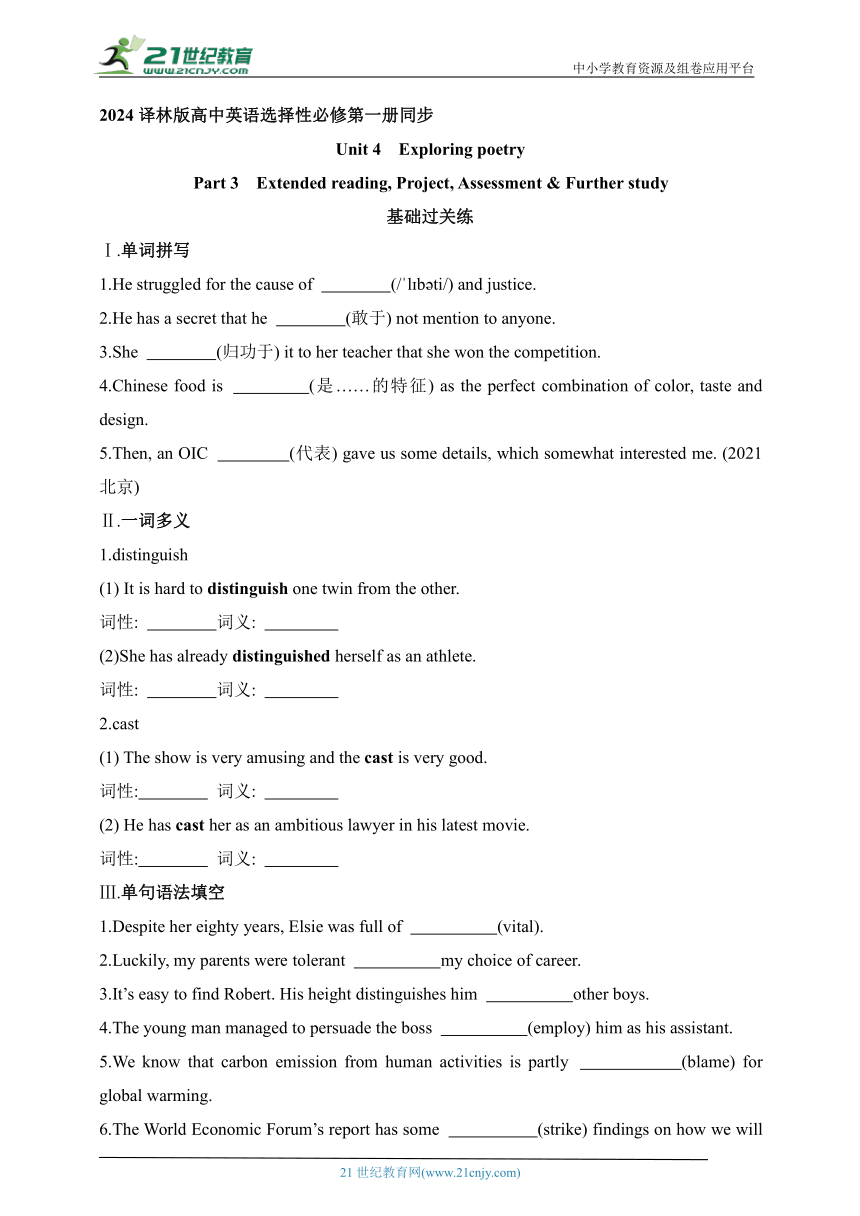
|
|
| 格式 | docx | ||
| 文件大小 | 1.0MB | ||
| 资源类型 | 试卷 | ||
| 版本资源 | 牛津译林版(2019) | ||
| 科目 | 英语 | ||
| 更新时间 | 2023-11-13 15:16:12 | ||
图片预览

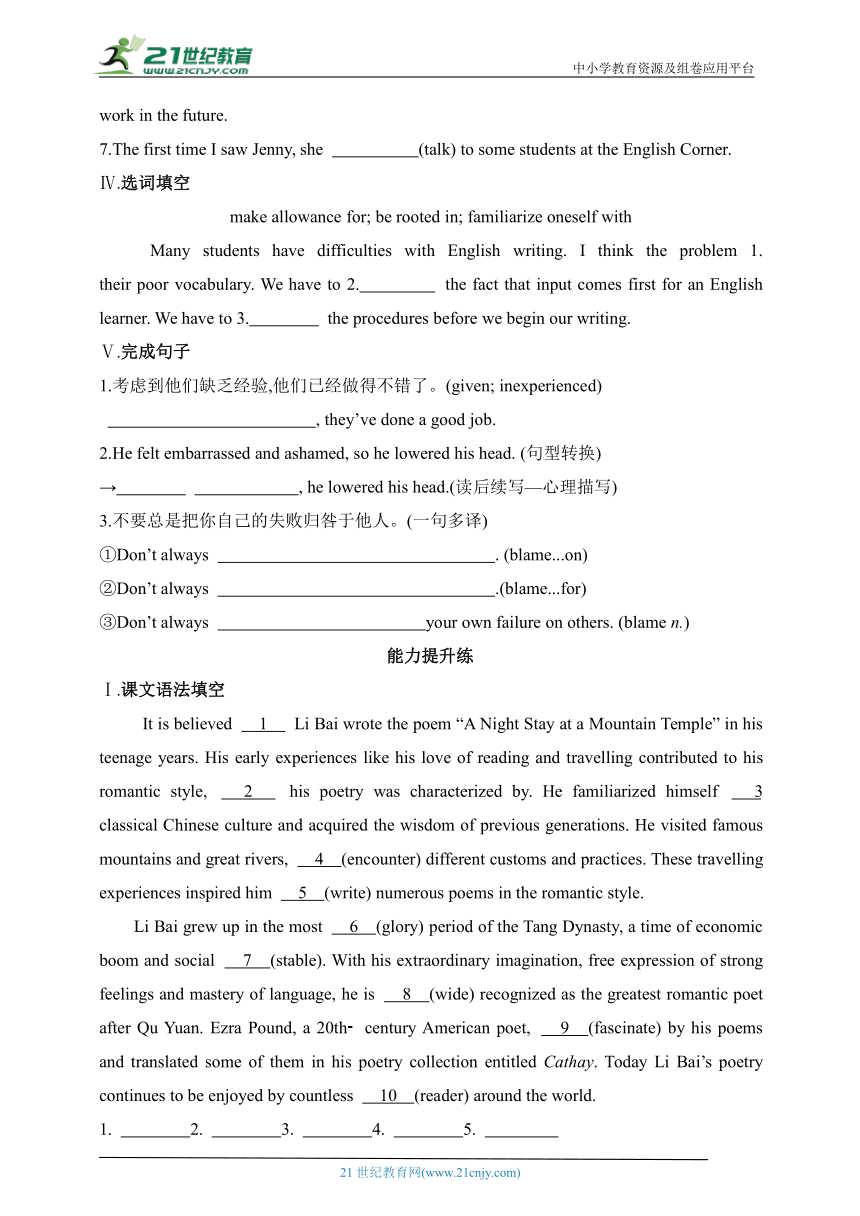
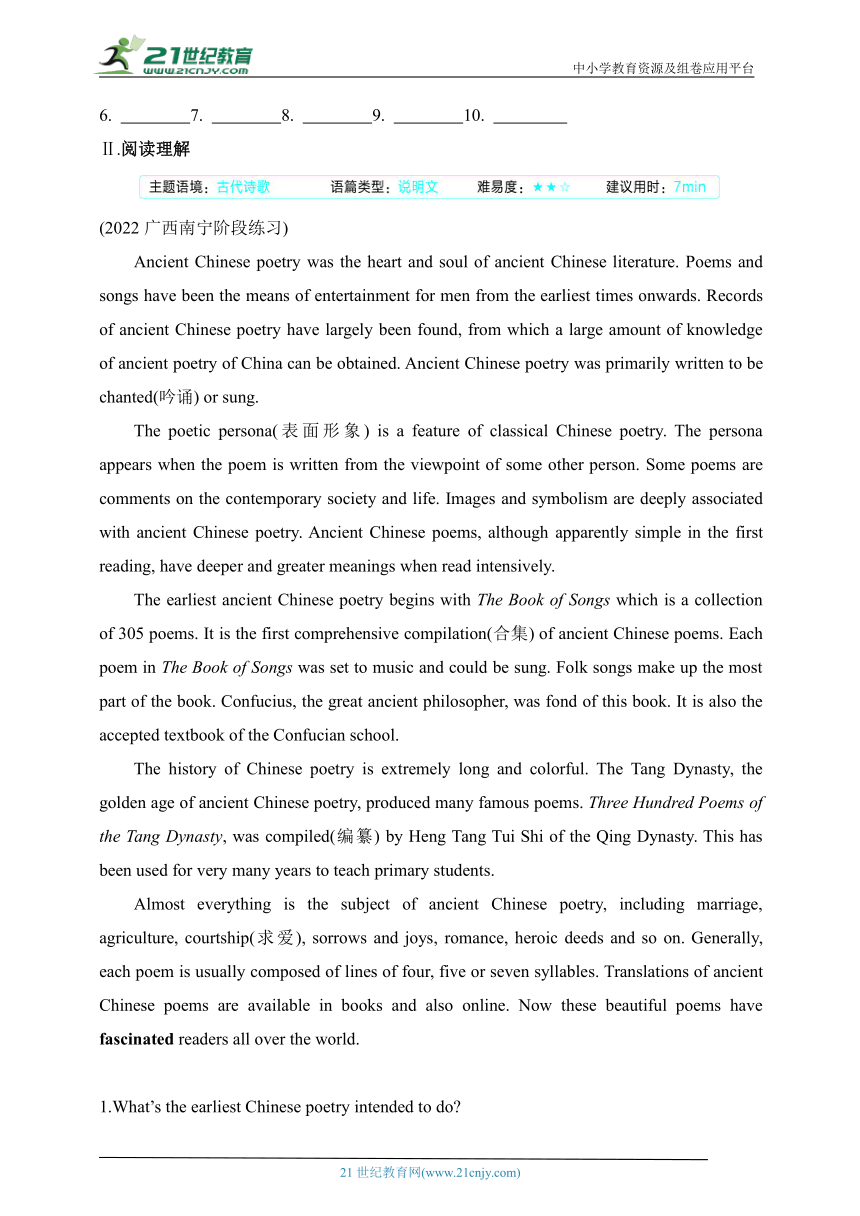
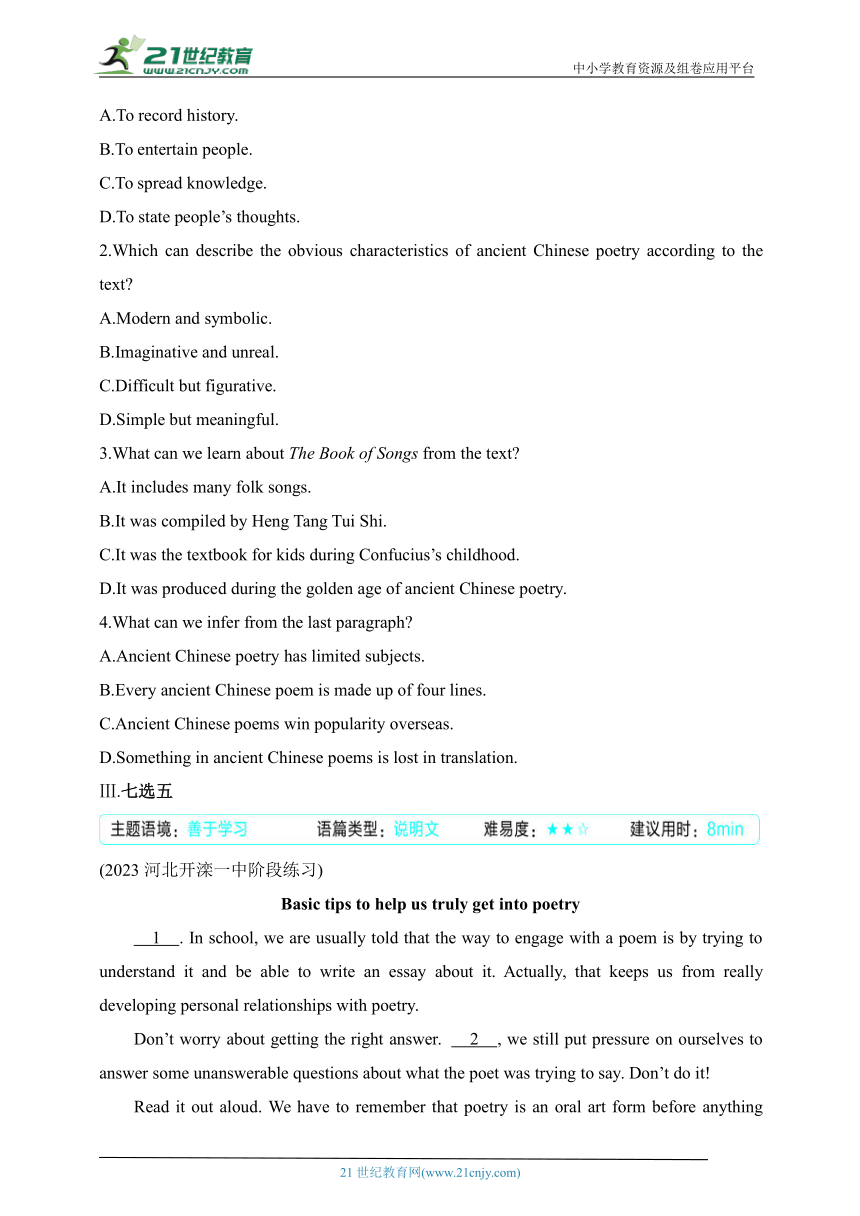
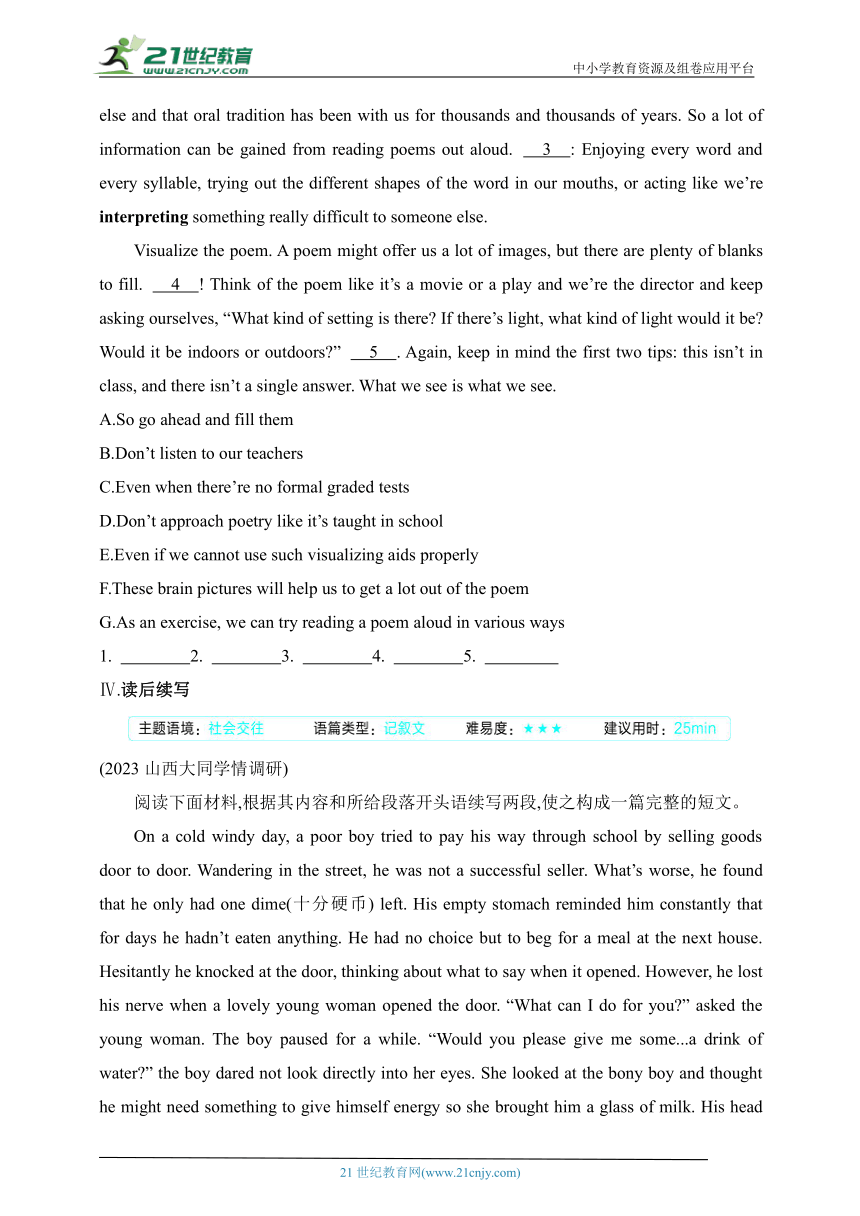
文档简介
中小学教育资源及组卷应用平台
2024译林版高中英语选择性必修第一册同步
Unit 4 Exploring poetry
Part 3 Extended reading, Project, Assessment & Further study
基础过关练
Ⅰ.单词拼写
1.He struggled for the cause of (/ l b ti/) and justice.
2.He has a secret that he (敢于) not mention to anyone.
3.She (归功于) it to her teacher that she won the competition.
4.Chinese food is (是……的特征) as the perfect combination of color, taste and design.
5.Then, an OIC (代表) gave us some details, which somewhat interested me. (2021北京)
Ⅱ.一词多义
1.distinguish
(1) It is hard to distinguish one twin from the other.
词性: 词义:
(2)She has already distinguished herself as an athlete.
词性: 词义:
2.cast
(1) The show is very amusing and the cast is very good.
词性: 词义:
(2) He has cast her as an ambitious lawyer in his latest movie.
词性: 词义:
Ⅲ.单句语法填空
1.Despite her eighty years, Elsie was full of (vital).
2.Luckily, my parents were tolerant my choice of career.
3.It’s easy to find Robert. His height distinguishes him other boys.
4.The young man managed to persuade the boss (employ) him as his assistant.
5.We know that carbon emission from human activities is partly (blame) for global warming.
6.The World Economic Forum’s report has some (strike) findings on how we will work in the future.
7.The first time I saw Jenny, she (talk) to some students at the English Corner.
Ⅳ.选词填空
make allowance for; be rooted in; familiarize oneself with
Many students have difficulties with English writing. I think the problem 1. their poor vocabulary. We have to 2. the fact that input comes first for an English learner. We have to 3. the procedures before we begin our writing.
Ⅴ.完成句子
1.考虑到他们缺乏经验,他们已经做得不错了。(given; inexperienced)
, they’ve done a good job.
2.He felt embarrassed and ashamed, so he lowered his head. (句型转换)
→ , he lowered his head.(读后续写—心理描写)
3.不要总是把你自己的失败归咎于他人。(一句多译)
①Don’t always . (blame...on)
②Don’t always .(blame...for)
③Don’t always your own failure on others. (blame n.)
能力提升练
Ⅰ.课文语法填空
It is believed 1 Li Bai wrote the poem “A Night Stay at a Mountain Temple” in his teenage years. His early experiences like his love of reading and travelling contributed to his romantic style, 2 his poetry was characterized by. He familiarized himself 3 classical Chinese culture and acquired the wisdom of previous generations. He visited famous mountains and great rivers, 4 (encounter) different customs and practices. These travelling experiences inspired him 5 (write) numerous poems in the romantic style.
Li Bai grew up in the most 6 (glory) period of the Tang Dynasty, a time of economic boom and social 7 (stable). With his extraordinary imagination, free expression of strong feelings and mastery of language, he is 8 (wide) recognized as the greatest romantic poet after Qu Yuan. Ezra Pound, a 20th century American poet, 9 (fascinate) by his poems and translated some of them in his poetry collection entitled Cathay. Today Li Bai’s poetry continues to be enjoyed by countless 10 (reader) around the world.
1. 2. 3. 4. 5.
6. 7. 8. 9. 10.
Ⅱ.阅读理解
(2022广西南宁阶段练习)
Ancient Chinese poetry was the heart and soul of ancient Chinese literature. Poems and songs have been the means of entertainment for men from the earliest times onwards. Records of ancient Chinese poetry have largely been found, from which a large amount of knowledge of ancient poetry of China can be obtained. Ancient Chinese poetry was primarily written to be chanted(吟诵) or sung.
The poetic persona(表面形象) is a feature of classical Chinese poetry. The persona appears when the poem is written from the viewpoint of some other person. Some poems are comments on the contemporary society and life. Images and symbolism are deeply associated with ancient Chinese poetry. Ancient Chinese poems, although apparently simple in the first reading, have deeper and greater meanings when read intensively.
The earliest ancient Chinese poetry begins with The Book of Songs which is a collection of 305 poems. It is the first comprehensive compilation(合集) of ancient Chinese poems. Each poem in The Book of Songs was set to music and could be sung. Folk songs make up the most part of the book. Confucius, the great ancient philosopher, was fond of this book. It is also the accepted textbook of the Confucian school.
The history of Chinese poetry is extremely long and colorful. The Tang Dynasty, the golden age of ancient Chinese poetry, produced many famous poems. Three Hundred Poems of the Tang Dynasty, was compiled(编纂) by Heng Tang Tui Shi of the Qing Dynasty. This has been used for very many years to teach primary students.
Almost everything is the subject of ancient Chinese poetry, including marriage, agriculture, courtship(求爱), sorrows and joys, romance, heroic deeds and so on. Generally, each poem is usually composed of lines of four, five or seven syllables. Translations of ancient Chinese poems are available in books and also online. Now these beautiful poems have fascinated readers all over the world.
1.What’s the earliest Chinese poetry intended to do
A.To record history.
B.To entertain people.
C.To spread knowledge.
D.To state people’s thoughts.
2.Which can describe the obvious characteristics of ancient Chinese poetry according to the text
A.Modern and symbolic.
B.Imaginative and unreal.
C.Difficult but figurative.
D.Simple but meaningful.
3.What can we learn about The Book of Songs from the text
A.It includes many folk songs.
B.It was compiled by Heng Tang Tui Shi.
C.It was the textbook for kids during Confucius’s childhood.
D.It was produced during the golden age of ancient Chinese poetry.
4.What can we infer from the last paragraph
A.Ancient Chinese poetry has limited subjects.
B.Every ancient Chinese poem is made up of four lines.
C.Ancient Chinese poems win popularity overseas.
D.Something in ancient Chinese poems is lost in translation.
Ⅲ.七选五
(2023河北开滦一中阶段练习)
Basic tips to help us truly get into poetry
1 . In school, we are usually told that the way to engage with a poem is by trying to understand it and be able to write an essay about it. Actually, that keeps us from really developing personal relationships with poetry.
Don’t worry about getting the right answer. 2 , we still put pressure on ourselves to answer some unanswerable questions about what the poet was trying to say. Don’t do it!
Read it out aloud. We have to remember that poetry is an oral art form before anything else and that oral tradition has been with us for thousands and thousands of years. So a lot of information can be gained from reading poems out aloud. 3 : Enjoying every word and every syllable, trying out the different shapes of the word in our mouths, or acting like we’re interpreting something really difficult to someone else.
Visualize the poem. A poem might offer us a lot of images, but there are plenty of blanks to fill. 4 ! Think of the poem like it’s a movie or a play and we’re the director and keep asking ourselves, “What kind of setting is there If there’s light, what kind of light would it be Would it be indoors or outdoors ” 5 . Again, keep in mind the first two tips: this isn’t in class, and there isn’t a single answer. What we see is what we see.
A.So go ahead and fill them
B.Don’t listen to our teachers
C.Even when there’re no formal graded tests
D.Don’t approach poetry like it’s taught in school
E.Even if we cannot use such visualizing aids properly
F.These brain pictures will help us to get a lot out of the poem
G.As an exercise, we can try reading a poem aloud in various ways
1. 2. 3. 4. 5.
Ⅳ.读后续写
(2023山西大同学情调研)
阅读下面材料,根据其内容和所给段落开头语续写两段,使之构成一篇完整的短文。
On a cold windy day, a poor boy tried to pay his way through school by selling goods door to door. Wandering in the street, he was not a successful seller. What’s worse, he found that he only had one dime(十分硬币) left. His empty stomach reminded him constantly that for days he hadn’t eaten anything. He had no choice but to beg for a meal at the next house. Hesitantly he knocked at the door, thinking about what to say when it opened. However, he lost his nerve when a lovely young woman opened the door. “What can I do for you ” asked the young woman. The boy paused for a while. “Would you please give me some...a drink of water ” the boy dared not look directly into her eyes. She looked at the bony boy and thought he might need something to give himself energy so she brought him a glass of milk. His head rising and small hands taking the cup, he drank it up slowly, and then asked, “How much do I owe you ” “You don’t owe me anything,” she replied with a warm smile on her face. “My mother has taught me never to accept payment for a kindness.” Deeply moved, he said sincerely, “Then I shall thank you from the bottom of my heart.” As Howard Kelly left that house, he felt stronger physically. It also increased his faith in God and the whole human race. As a matter of fact, he was about to give up and quit before that point.
Years later the young woman became critically ill. However, the local doctors were unable to give her the effective medical treatment. Finally they sent her to a hospital in the big city, where specialists could be called in to cure her rare disease. Among those famous specialists, Dr. Howard Kelly was called in for consultation. When he heard the name of the town she came from, a strange light filled his eyes. Immediately, he rose and went down through the hospital hall into her room.
注意:续写词数应为150左右。
Paragraph 1:
Dressed in his doctor’s gown,he went in to see her.
Paragraph 2:
The bill was sent to her room.
答案与分层梯度式解析
Unit 4 Exploring poetry
Part 3 Extended reading, Project, Assessment & Further study
基础过关练
Ⅰ.1.liberty 2.dares 3.owed 4.characterized 5.representative
Ⅱ.1.(1)动词;区分,辨别 句意:很难分辨出一对孪生儿谁是谁。
(2)动词;使著名 句意:作为运动员她已享有盛名。
2.(1)名词;全体演员 句意:表演非常有趣,全体演员都很优秀。
(2)动词;选派角色 句意:他选定她在他最近的一部影片里扮演一名雄心勃勃的律师。
Ⅲ.1.vitality 考查名词。be full of...意为“充满……”,后接名词作宾语,故填vitality。 句意:尽管埃尔茜已经80岁了,但她仍然充满活力。
2.of/towards 考查介词。be tolerant of/towards...意为“对……宽容”,为固定搭配。故填of或towards。
3.from 考查介词。distinguish...from...意为“把……和……区分开”,为固定搭配。故填from。句意:要找到罗伯特很容易,从身高就能把他和其他男孩区分开。
4.to employ 考查动词不定式。动词persuade后接动词不定式作宾语补足语。故填to employ。句意:这个年轻人成功地说服了老板雇他当助手。
5.to blame 考查固定用法。be to blame for...意为“对……负有责任”,为固定用法。故填to blame。句意:我们知道人类活动带来的碳排放对全球变暖负有部分责任。
6.striking 考查形容词。设空处修饰名词findings,应用形容词作定语。故填striking。句意:这份世界经济论坛的报告有一些关于我们未来的工作方式的引人注目的发现。
7.was talking 考查动词的时态。句意:我第一次见到珍妮时,她正在英语角和一些学生交谈。根据The first time I saw Jenny可知,此处谓语动词表示过去某个时间点正在发生的动作,所以应用过去进行时。故填was talking。
Ⅳ.1.is rooted in 2.make allowance for 3.familiarize ourselves with
Ⅴ.1.Given that they’re inexperienced 2.Embarrassed and ashamed
3.①blame your own failure on others ②blame others for your own failure ③put/lay the blame for
能力提升练
Ⅰ.1.that 考查主语从句。“It is/was+过去分词+that...”是固定句式,意为“据……”,其中It是形式主语,that引导的主语从句是真正的主语。故填that。
2.which 考查定语从句。分析句子可知,设空处无引导词,“ 2 his poetry was characterized by”中缺少主语,所以推测设空处引导非限制性定语从句,修饰指物的先行词his romantic style,故应用which引导定语从句。故填which。
3.with 考查介词。familiarize oneself with...意为“使自己通晓……”,为固定短语。故填with。
4.encountering 考查动词 ing形式。分析句子成分可知,句中已有谓语动词,所以设空处应用非谓语动词形式;所给提示词encounter与其逻辑主语He之间是主动关系,所以应用动词 ing形式。故填encountering。
5.to write 考查动词不定式。inspire sb. to do sth.意为“激励/启发某人做某事”,动词不定式作宾语补足语。故填to write。
6.glorious 考查形容词。设空处修饰名词period,应用形容词作定语。故填glorious。
7.stability 考查名词。“social 7 ”和“economic boom”并列,根据空前的形容词social可知设空处应用名词。故填stability。
8.widely 考查副词。设空处修饰谓语动词,应用副词作状语。故填widely。
9.was fascinated 考查时态、语态和主谓一致。根据后面的and translated可知设空处和translated并列作谓语,也应用一般过去时;主语Ezra Pound和所给提示词fascinate之间是被动关系,应用被动语态;主语是单数,谓语动词也应用单数形式。故填was fascinated。
10.readers 考查名词复数。根据空前的形容词countless可知设空处应用名词复数。故填readers。
Ⅱ.◎语篇解读 本文是一篇说明文,主要介绍了中国古代诗歌的起源、发展、特点、主题等。
1.B 细节理解题。根据第一段第二句可知,从最早时期开始,诗歌和歌曲就是人们的娱乐方式。故选B。
2.D 细节理解题。根据第二段最后一句可知,中国古代诗歌虽然在初读时似乎很简单,但是精读之后有更深更重大的意义。由此可知,中国古代诗歌的明显特征应该是简单但有意义。故选D。
3.A 细节理解题。根据第三段中的“Each poem in The Book of Songs was set to music and could be sung. Folk songs make up the most part of the book.”可知,《诗经》中的每一首诗都配上了音乐,可以演唱,民歌占了这本书的大部分。故选A。
4.C 推理判断题。根据最后一段最后两句可知,中国古代诗歌的译作可以在书本中找到,也可以在网上找到,现在这些优美的诗歌吸引了世界各地的读者。由此可推测,中国古代诗歌在国外也受到了人们的喜爱。故选C。
【高频词汇】 1.entertainment n.娱乐 2.obtain vt.获得,赢得 3.be associated with...与……有联系4.comprehensive adj.全面的;详尽的 5.make up构成,组成 6.be composed of...由……组成
长难句
原句 Records of ancient Chinese poetry have largely been found, from which a large amount of knowledge of ancient poetry of China can be obtained.
分析 这是一个主从复合句。from which引导非限制性定语从句,修饰先行词Records of ancient Chinese poetry。
译文 中国古代诗歌的记载已经被大量发现,从中可以获得大量的中国古代诗歌知识。
Ⅲ.◎语篇解读 这是一篇说明文。文章主要介绍了帮助我们真正喜欢上诗歌的基本技巧。
1.D 根据下文可知,在学校里,我们通常被告知,与一首诗建立密切关系的方法是试图理解它,并能够写一篇关于它的文章,事实上,这阻碍了我们与诗歌建立个人关系。本段提到了在学校里学习诗歌时存在的问题,故D项符合语境,in school是原词复现,故选D。
2.C 本段主旨句为“Don’t worry about getting the right answer.(不要为得到正确的答案而焦虑。)”;根据下文可知,我们仍然强迫自己回答一些无法回答的关于诗人想要表达什么的问题,由此可知,此处为反向举例,结合“getting the right answer”和“answer some unanswerable questions”可知C项符合语境,故选C。
3.G 根据上文可知,从朗读诗歌中可以获得很多信息;下文说,享受每一个字和每一个音节,尝试以不同的口型读字,或者假装我们在向别人解释非常困难的事情。由此可推断,G项符合语境。G项中“reading a poem”对应本段的主旨句“Read it out aloud.”,故选G。
4.A 根据上文可知,一首诗可以给我们提供许多意象,但也有许多空白需要填补。A项中的“fill them”对应上文中“plenty of blanks to fill”。故A项符合语境。故选A。
5.F 本段主旨句为“Visualize the poem.(想象这首诗。)”,设空处上文列举了想象诗歌的方式,并通过几个问句引导我们对诗歌的具体想象,故F项符合语境,承接上文说明其作用。故选F。
【高频词汇】 1.basic adj.基本的 2.engage with...与……建立密切关系 3.put pressure on强迫;促使;劝说 4.tradition n.传统 5.keep... in mind将……记在心中;考虑
【熟词生义】 approach v.对付,处理
长难句
原句 We have to remember that poetry is an oral art form before anything else and that oral tradition has been with us for thousands and thousands of years.
分析 本句为主从复合句。连词and连接两个that引导的宾语从句,作动词remember的宾语。
译文 我们必须记住,诗歌是一种口头艺术形式,比其他任何形式都要早,口头传统已经伴随我们成千上万年了。
Ⅳ.
写作指导
情节线 情感线
故 事 要 素 Time on a cold windy day, years later 迟疑、紧张 感动 重拾信心 激动 担心 开心 (the young woman) 迟疑、担心 感动
Place in the street, a young woman’s house, a hospital in the big city
Character Dr. Howard Kelly(the poor boy), the young woman (the patient)
情 节 Beginning A poor boy was so hungry that he had no choice but to beg for a meal. A young woman gave him a glass of milk. The poor boy was moved and regained his faith.
Development Years later, the young woman was critically ill and sent to the hospital where Dr. Howard Kelly worked.
续 写 方 向 Para. 1 Dressed in his doctor’s gown, he went in to see her.
①Howard Kelly认出病人了吗 他是如何做的 ②这位女士被治愈了吗 ③下段首句提到了bill,Howard Kelly做了什么
Para. 2 The bill was sent to her room.
①这位女士看到账单的反应 ②关于账单Howard Kelly具体做了什么
One possible version:
Paragraph 1:
Dressed in his doctor’s gown, he went in to see her. He saw her lying on the bed and recognized her at once. Her lovely face looked pale. He went back to the consultation room and determined to do his best to save her life. From that day on, he gave special attention to her case. Luckily, after a long struggle, they won the battle. Dr. Howard Kelly requested the accounting office to pass the final bill to him. He looked at it and then wrote something on the side.
Paragraph 2:
The bill was sent to her room. Hesitantly she took it. She was afraid to open it because she was sure that it would take the rest of her life to pay it off. Finally she opened it, on the side of which a note caught her attention. She read these words. “Paid in full with a glass of milk,” signed by Dr. Howard Kelly. Tears of joy flooded her eyes as she prayed silently, “Thank you, God.”
21世纪教育网 www.21cnjy.com 精品试卷·第 2 页 (共 2 页)
21世纪教育网(www.21cnjy.com)
2024译林版高中英语选择性必修第一册同步
Unit 4 Exploring poetry
Part 3 Extended reading, Project, Assessment & Further study
基础过关练
Ⅰ.单词拼写
1.He struggled for the cause of (/ l b ti/) and justice.
2.He has a secret that he (敢于) not mention to anyone.
3.She (归功于) it to her teacher that she won the competition.
4.Chinese food is (是……的特征) as the perfect combination of color, taste and design.
5.Then, an OIC (代表) gave us some details, which somewhat interested me. (2021北京)
Ⅱ.一词多义
1.distinguish
(1) It is hard to distinguish one twin from the other.
词性: 词义:
(2)She has already distinguished herself as an athlete.
词性: 词义:
2.cast
(1) The show is very amusing and the cast is very good.
词性: 词义:
(2) He has cast her as an ambitious lawyer in his latest movie.
词性: 词义:
Ⅲ.单句语法填空
1.Despite her eighty years, Elsie was full of (vital).
2.Luckily, my parents were tolerant my choice of career.
3.It’s easy to find Robert. His height distinguishes him other boys.
4.The young man managed to persuade the boss (employ) him as his assistant.
5.We know that carbon emission from human activities is partly (blame) for global warming.
6.The World Economic Forum’s report has some (strike) findings on how we will work in the future.
7.The first time I saw Jenny, she (talk) to some students at the English Corner.
Ⅳ.选词填空
make allowance for; be rooted in; familiarize oneself with
Many students have difficulties with English writing. I think the problem 1. their poor vocabulary. We have to 2. the fact that input comes first for an English learner. We have to 3. the procedures before we begin our writing.
Ⅴ.完成句子
1.考虑到他们缺乏经验,他们已经做得不错了。(given; inexperienced)
, they’ve done a good job.
2.He felt embarrassed and ashamed, so he lowered his head. (句型转换)
→ , he lowered his head.(读后续写—心理描写)
3.不要总是把你自己的失败归咎于他人。(一句多译)
①Don’t always . (blame...on)
②Don’t always .(blame...for)
③Don’t always your own failure on others. (blame n.)
能力提升练
Ⅰ.课文语法填空
It is believed 1 Li Bai wrote the poem “A Night Stay at a Mountain Temple” in his teenage years. His early experiences like his love of reading and travelling contributed to his romantic style, 2 his poetry was characterized by. He familiarized himself 3 classical Chinese culture and acquired the wisdom of previous generations. He visited famous mountains and great rivers, 4 (encounter) different customs and practices. These travelling experiences inspired him 5 (write) numerous poems in the romantic style.
Li Bai grew up in the most 6 (glory) period of the Tang Dynasty, a time of economic boom and social 7 (stable). With his extraordinary imagination, free expression of strong feelings and mastery of language, he is 8 (wide) recognized as the greatest romantic poet after Qu Yuan. Ezra Pound, a 20th century American poet, 9 (fascinate) by his poems and translated some of them in his poetry collection entitled Cathay. Today Li Bai’s poetry continues to be enjoyed by countless 10 (reader) around the world.
1. 2. 3. 4. 5.
6. 7. 8. 9. 10.
Ⅱ.阅读理解
(2022广西南宁阶段练习)
Ancient Chinese poetry was the heart and soul of ancient Chinese literature. Poems and songs have been the means of entertainment for men from the earliest times onwards. Records of ancient Chinese poetry have largely been found, from which a large amount of knowledge of ancient poetry of China can be obtained. Ancient Chinese poetry was primarily written to be chanted(吟诵) or sung.
The poetic persona(表面形象) is a feature of classical Chinese poetry. The persona appears when the poem is written from the viewpoint of some other person. Some poems are comments on the contemporary society and life. Images and symbolism are deeply associated with ancient Chinese poetry. Ancient Chinese poems, although apparently simple in the first reading, have deeper and greater meanings when read intensively.
The earliest ancient Chinese poetry begins with The Book of Songs which is a collection of 305 poems. It is the first comprehensive compilation(合集) of ancient Chinese poems. Each poem in The Book of Songs was set to music and could be sung. Folk songs make up the most part of the book. Confucius, the great ancient philosopher, was fond of this book. It is also the accepted textbook of the Confucian school.
The history of Chinese poetry is extremely long and colorful. The Tang Dynasty, the golden age of ancient Chinese poetry, produced many famous poems. Three Hundred Poems of the Tang Dynasty, was compiled(编纂) by Heng Tang Tui Shi of the Qing Dynasty. This has been used for very many years to teach primary students.
Almost everything is the subject of ancient Chinese poetry, including marriage, agriculture, courtship(求爱), sorrows and joys, romance, heroic deeds and so on. Generally, each poem is usually composed of lines of four, five or seven syllables. Translations of ancient Chinese poems are available in books and also online. Now these beautiful poems have fascinated readers all over the world.
1.What’s the earliest Chinese poetry intended to do
A.To record history.
B.To entertain people.
C.To spread knowledge.
D.To state people’s thoughts.
2.Which can describe the obvious characteristics of ancient Chinese poetry according to the text
A.Modern and symbolic.
B.Imaginative and unreal.
C.Difficult but figurative.
D.Simple but meaningful.
3.What can we learn about The Book of Songs from the text
A.It includes many folk songs.
B.It was compiled by Heng Tang Tui Shi.
C.It was the textbook for kids during Confucius’s childhood.
D.It was produced during the golden age of ancient Chinese poetry.
4.What can we infer from the last paragraph
A.Ancient Chinese poetry has limited subjects.
B.Every ancient Chinese poem is made up of four lines.
C.Ancient Chinese poems win popularity overseas.
D.Something in ancient Chinese poems is lost in translation.
Ⅲ.七选五
(2023河北开滦一中阶段练习)
Basic tips to help us truly get into poetry
1 . In school, we are usually told that the way to engage with a poem is by trying to understand it and be able to write an essay about it. Actually, that keeps us from really developing personal relationships with poetry.
Don’t worry about getting the right answer. 2 , we still put pressure on ourselves to answer some unanswerable questions about what the poet was trying to say. Don’t do it!
Read it out aloud. We have to remember that poetry is an oral art form before anything else and that oral tradition has been with us for thousands and thousands of years. So a lot of information can be gained from reading poems out aloud. 3 : Enjoying every word and every syllable, trying out the different shapes of the word in our mouths, or acting like we’re interpreting something really difficult to someone else.
Visualize the poem. A poem might offer us a lot of images, but there are plenty of blanks to fill. 4 ! Think of the poem like it’s a movie or a play and we’re the director and keep asking ourselves, “What kind of setting is there If there’s light, what kind of light would it be Would it be indoors or outdoors ” 5 . Again, keep in mind the first two tips: this isn’t in class, and there isn’t a single answer. What we see is what we see.
A.So go ahead and fill them
B.Don’t listen to our teachers
C.Even when there’re no formal graded tests
D.Don’t approach poetry like it’s taught in school
E.Even if we cannot use such visualizing aids properly
F.These brain pictures will help us to get a lot out of the poem
G.As an exercise, we can try reading a poem aloud in various ways
1. 2. 3. 4. 5.
Ⅳ.读后续写
(2023山西大同学情调研)
阅读下面材料,根据其内容和所给段落开头语续写两段,使之构成一篇完整的短文。
On a cold windy day, a poor boy tried to pay his way through school by selling goods door to door. Wandering in the street, he was not a successful seller. What’s worse, he found that he only had one dime(十分硬币) left. His empty stomach reminded him constantly that for days he hadn’t eaten anything. He had no choice but to beg for a meal at the next house. Hesitantly he knocked at the door, thinking about what to say when it opened. However, he lost his nerve when a lovely young woman opened the door. “What can I do for you ” asked the young woman. The boy paused for a while. “Would you please give me some...a drink of water ” the boy dared not look directly into her eyes. She looked at the bony boy and thought he might need something to give himself energy so she brought him a glass of milk. His head rising and small hands taking the cup, he drank it up slowly, and then asked, “How much do I owe you ” “You don’t owe me anything,” she replied with a warm smile on her face. “My mother has taught me never to accept payment for a kindness.” Deeply moved, he said sincerely, “Then I shall thank you from the bottom of my heart.” As Howard Kelly left that house, he felt stronger physically. It also increased his faith in God and the whole human race. As a matter of fact, he was about to give up and quit before that point.
Years later the young woman became critically ill. However, the local doctors were unable to give her the effective medical treatment. Finally they sent her to a hospital in the big city, where specialists could be called in to cure her rare disease. Among those famous specialists, Dr. Howard Kelly was called in for consultation. When he heard the name of the town she came from, a strange light filled his eyes. Immediately, he rose and went down through the hospital hall into her room.
注意:续写词数应为150左右。
Paragraph 1:
Dressed in his doctor’s gown,he went in to see her.
Paragraph 2:
The bill was sent to her room.
答案与分层梯度式解析
Unit 4 Exploring poetry
Part 3 Extended reading, Project, Assessment & Further study
基础过关练
Ⅰ.1.liberty 2.dares 3.owed 4.characterized 5.representative
Ⅱ.1.(1)动词;区分,辨别 句意:很难分辨出一对孪生儿谁是谁。
(2)动词;使著名 句意:作为运动员她已享有盛名。
2.(1)名词;全体演员 句意:表演非常有趣,全体演员都很优秀。
(2)动词;选派角色 句意:他选定她在他最近的一部影片里扮演一名雄心勃勃的律师。
Ⅲ.1.vitality 考查名词。be full of...意为“充满……”,后接名词作宾语,故填vitality。 句意:尽管埃尔茜已经80岁了,但她仍然充满活力。
2.of/towards 考查介词。be tolerant of/towards...意为“对……宽容”,为固定搭配。故填of或towards。
3.from 考查介词。distinguish...from...意为“把……和……区分开”,为固定搭配。故填from。句意:要找到罗伯特很容易,从身高就能把他和其他男孩区分开。
4.to employ 考查动词不定式。动词persuade后接动词不定式作宾语补足语。故填to employ。句意:这个年轻人成功地说服了老板雇他当助手。
5.to blame 考查固定用法。be to blame for...意为“对……负有责任”,为固定用法。故填to blame。句意:我们知道人类活动带来的碳排放对全球变暖负有部分责任。
6.striking 考查形容词。设空处修饰名词findings,应用形容词作定语。故填striking。句意:这份世界经济论坛的报告有一些关于我们未来的工作方式的引人注目的发现。
7.was talking 考查动词的时态。句意:我第一次见到珍妮时,她正在英语角和一些学生交谈。根据The first time I saw Jenny可知,此处谓语动词表示过去某个时间点正在发生的动作,所以应用过去进行时。故填was talking。
Ⅳ.1.is rooted in 2.make allowance for 3.familiarize ourselves with
Ⅴ.1.Given that they’re inexperienced 2.Embarrassed and ashamed
3.①blame your own failure on others ②blame others for your own failure ③put/lay the blame for
能力提升练
Ⅰ.1.that 考查主语从句。“It is/was+过去分词+that...”是固定句式,意为“据……”,其中It是形式主语,that引导的主语从句是真正的主语。故填that。
2.which 考查定语从句。分析句子可知,设空处无引导词,“ 2 his poetry was characterized by”中缺少主语,所以推测设空处引导非限制性定语从句,修饰指物的先行词his romantic style,故应用which引导定语从句。故填which。
3.with 考查介词。familiarize oneself with...意为“使自己通晓……”,为固定短语。故填with。
4.encountering 考查动词 ing形式。分析句子成分可知,句中已有谓语动词,所以设空处应用非谓语动词形式;所给提示词encounter与其逻辑主语He之间是主动关系,所以应用动词 ing形式。故填encountering。
5.to write 考查动词不定式。inspire sb. to do sth.意为“激励/启发某人做某事”,动词不定式作宾语补足语。故填to write。
6.glorious 考查形容词。设空处修饰名词period,应用形容词作定语。故填glorious。
7.stability 考查名词。“social 7 ”和“economic boom”并列,根据空前的形容词social可知设空处应用名词。故填stability。
8.widely 考查副词。设空处修饰谓语动词,应用副词作状语。故填widely。
9.was fascinated 考查时态、语态和主谓一致。根据后面的and translated可知设空处和translated并列作谓语,也应用一般过去时;主语Ezra Pound和所给提示词fascinate之间是被动关系,应用被动语态;主语是单数,谓语动词也应用单数形式。故填was fascinated。
10.readers 考查名词复数。根据空前的形容词countless可知设空处应用名词复数。故填readers。
Ⅱ.◎语篇解读 本文是一篇说明文,主要介绍了中国古代诗歌的起源、发展、特点、主题等。
1.B 细节理解题。根据第一段第二句可知,从最早时期开始,诗歌和歌曲就是人们的娱乐方式。故选B。
2.D 细节理解题。根据第二段最后一句可知,中国古代诗歌虽然在初读时似乎很简单,但是精读之后有更深更重大的意义。由此可知,中国古代诗歌的明显特征应该是简单但有意义。故选D。
3.A 细节理解题。根据第三段中的“Each poem in The Book of Songs was set to music and could be sung. Folk songs make up the most part of the book.”可知,《诗经》中的每一首诗都配上了音乐,可以演唱,民歌占了这本书的大部分。故选A。
4.C 推理判断题。根据最后一段最后两句可知,中国古代诗歌的译作可以在书本中找到,也可以在网上找到,现在这些优美的诗歌吸引了世界各地的读者。由此可推测,中国古代诗歌在国外也受到了人们的喜爱。故选C。
【高频词汇】 1.entertainment n.娱乐 2.obtain vt.获得,赢得 3.be associated with...与……有联系4.comprehensive adj.全面的;详尽的 5.make up构成,组成 6.be composed of...由……组成
长难句
原句 Records of ancient Chinese poetry have largely been found, from which a large amount of knowledge of ancient poetry of China can be obtained.
分析 这是一个主从复合句。from which引导非限制性定语从句,修饰先行词Records of ancient Chinese poetry。
译文 中国古代诗歌的记载已经被大量发现,从中可以获得大量的中国古代诗歌知识。
Ⅲ.◎语篇解读 这是一篇说明文。文章主要介绍了帮助我们真正喜欢上诗歌的基本技巧。
1.D 根据下文可知,在学校里,我们通常被告知,与一首诗建立密切关系的方法是试图理解它,并能够写一篇关于它的文章,事实上,这阻碍了我们与诗歌建立个人关系。本段提到了在学校里学习诗歌时存在的问题,故D项符合语境,in school是原词复现,故选D。
2.C 本段主旨句为“Don’t worry about getting the right answer.(不要为得到正确的答案而焦虑。)”;根据下文可知,我们仍然强迫自己回答一些无法回答的关于诗人想要表达什么的问题,由此可知,此处为反向举例,结合“getting the right answer”和“answer some unanswerable questions”可知C项符合语境,故选C。
3.G 根据上文可知,从朗读诗歌中可以获得很多信息;下文说,享受每一个字和每一个音节,尝试以不同的口型读字,或者假装我们在向别人解释非常困难的事情。由此可推断,G项符合语境。G项中“reading a poem”对应本段的主旨句“Read it out aloud.”,故选G。
4.A 根据上文可知,一首诗可以给我们提供许多意象,但也有许多空白需要填补。A项中的“fill them”对应上文中“plenty of blanks to fill”。故A项符合语境。故选A。
5.F 本段主旨句为“Visualize the poem.(想象这首诗。)”,设空处上文列举了想象诗歌的方式,并通过几个问句引导我们对诗歌的具体想象,故F项符合语境,承接上文说明其作用。故选F。
【高频词汇】 1.basic adj.基本的 2.engage with...与……建立密切关系 3.put pressure on强迫;促使;劝说 4.tradition n.传统 5.keep... in mind将……记在心中;考虑
【熟词生义】 approach v.对付,处理
长难句
原句 We have to remember that poetry is an oral art form before anything else and that oral tradition has been with us for thousands and thousands of years.
分析 本句为主从复合句。连词and连接两个that引导的宾语从句,作动词remember的宾语。
译文 我们必须记住,诗歌是一种口头艺术形式,比其他任何形式都要早,口头传统已经伴随我们成千上万年了。
Ⅳ.
写作指导
情节线 情感线
故 事 要 素 Time on a cold windy day, years later 迟疑、紧张 感动 重拾信心 激动 担心 开心 (the young woman) 迟疑、担心 感动
Place in the street, a young woman’s house, a hospital in the big city
Character Dr. Howard Kelly(the poor boy), the young woman (the patient)
情 节 Beginning A poor boy was so hungry that he had no choice but to beg for a meal. A young woman gave him a glass of milk. The poor boy was moved and regained his faith.
Development Years later, the young woman was critically ill and sent to the hospital where Dr. Howard Kelly worked.
续 写 方 向 Para. 1 Dressed in his doctor’s gown, he went in to see her.
①Howard Kelly认出病人了吗 他是如何做的 ②这位女士被治愈了吗 ③下段首句提到了bill,Howard Kelly做了什么
Para. 2 The bill was sent to her room.
①这位女士看到账单的反应 ②关于账单Howard Kelly具体做了什么
One possible version:
Paragraph 1:
Dressed in his doctor’s gown, he went in to see her. He saw her lying on the bed and recognized her at once. Her lovely face looked pale. He went back to the consultation room and determined to do his best to save her life. From that day on, he gave special attention to her case. Luckily, after a long struggle, they won the battle. Dr. Howard Kelly requested the accounting office to pass the final bill to him. He looked at it and then wrote something on the side.
Paragraph 2:
The bill was sent to her room. Hesitantly she took it. She was afraid to open it because she was sure that it would take the rest of her life to pay it off. Finally she opened it, on the side of which a note caught her attention. She read these words. “Paid in full with a glass of milk,” signed by Dr. Howard Kelly. Tears of joy flooded her eyes as she prayed silently, “Thank you, God.”
21世纪教育网 www.21cnjy.com 精品试卷·第 2 页 (共 2 页)
21世纪教育网(www.21cnjy.com)
同课章节目录
- Unit 1 Food matters
- Welcome to the unit
- Reading
- Grammar and usage
- Integrated skills
- Extended reading
- Project
- Unit 2 The Universal Language
- Welcome to the unit
- Reading
- Grammar and usage
- Integrated skills
- Extended reading
- Project
- Unit 3 The art of painting
- Welcome to the unit
- Reading
- Grammar and usage
- Integrated skills
- Extended reading
- Project
- Unit 4 Exploring poetry
- Welcome to the unit
- Reading
- Grammar and usage
- Integrated skills
- Extended reading
- Project
